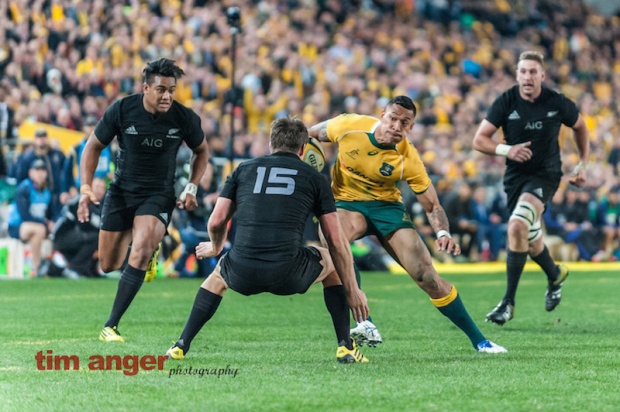Brian Smith shares his thoughts on the selection dilemma Michael Cheika faces in picking our starting fullback and various other finals-week issues with Richard Edwards from GAGR.
Folau call Cheikas toughest yet
On his day, Israel Folau is World XV material. But he has clearly struggled in each match he’s played in the tournament. Folau is an agility based athlete and his ankle injury is compromising his agility, along with his confidence and decisiveness.
Michael Cheika would have to be having some sleepless nights wondering whether he will be able to continue with Folau or not. When you take a purely clinical look at the situation, it’s pretty clear that a 100% fit Beale has contributed more in this tournament than an 80% fit Folau.
Like all of us, Cheika will be hoping for a noticeable improvement in Folau’s ankle, otherwise he could find himself having to make what would have to be his toughest selection decision yet.
That said, Cheika has nailed all selection decisions so far. The inclusion of David Pocock last week a masterstroke and he deserves our full support for whatever decision he makes this week.
Our attack last weekend was very well designed
Looking back to the Argentina game, there were some things that really stood out from our performance. One of these was the attacking tactics Stephen Larkham designed for this match and there are some key elements that should be called out.
The first was the play from the centre-field scrum early in the match that resulted in Adam Ashley Cooper’s first try. It was a play that was clearly designed to counter the blitz defence and put our wide runners into space. It was also a move that Larkham executed to perfection on many occasions during his playing days.
The key to it though is the accuracy of the long pass and on this occasion, Bernard Foley threw a brilliant Larkham-like ball to Ashley Cooper who scored in the corner.
Another really pleasing aspect was attacking the opposing half-back on the blind side. It worked against Scotland and it worked again against the Pumas. A very good example was when Nick Phipps created a bit of space down the left flank for Drew Mitchell who ran coast-to-coast to gift Ashley-Cooper his third try.
I also reckon that the direct running from Toby Smith and Tatafu Polota-Nau in the second half had a huge impact on the outcome. Their ball carries made inroads into the Argentinian defence and got us on the front foot. That was invaluable because, although we’d scored three tries at that point, Argentina were still in striking distance and showing some ascendency.
Our defence was stoic and gutsy
Turning from attack to defence, we dug in, once again, like lives depended on it and all contributed.
Worthy of a special mention, though, was Pocock who stole three or four balls again and has put a huge marker down for player of the tournament. He’s in a league of his own as a fetcher and his turnovers saved the Wallabies skin a number of times.
Pocock’s combination with Michael Hooper and Scott Fardy, who has also had a bumper World Cup, has been outstanding. It’s possible that the final will come down to the ‘battle-of-the-breakdown’ and many people from both sides of the ditch are starting to think we have an edge in this area.
Another defensive stand-out was our line speed. It was terrific and we will have to keep that up this weekend. The only way we can reduce the inevitable destructive impact of players like Ma’a Nonu is to cut down their time and space. Also, Aaron Smith thrives on quick ball and is almost unplayable if he gets two quick rucks in succession.
We also mixed up our lineout defence nicely against Argentina. Take the Argentinian line-out inside our 22 at around the 20 minute mark. On this occasion we picked it off by taking them on in the air, rather than not contesting and committing seven heads to resist the shove. This sort of variation will need to be continued against the All Blacks as they have one of the best attacking line-outs in the business.
Scrum and attacking line-out need work
Although there were many positives to come from the Puma’s match, we must address the scrum and our attacking line-out.
But first the scrum.
Slipper got hammered by Wayne Barnes at scrum time. Wayne has a tendency to do that. He often goes after one prop and it’s virtually impossible to change his perception as the match proceeds.
But the New Zealand scrum wasn’t that flash against South Africa in the other semi and shouldn’t present the challenge that the Pumas did for us.
With a bit of tinkering we should be right. Scott Sio being able to play would also help our prospects. But if Sio doesn’t come good and Slipper finds himself under sustained pressure again, Smith proved last week that he’s a very capable replacement in the scrum as well as carrying the ball.
The Wallabies also need to improve their attacking lineout. There were too many missed calls and sloppy execution, while the All Black’s line-out defence against the Boks was outstanding. This is a crucial area to address this week.
One thing we must do if we find ourselves under pressure is to shorten up our line-out to 4 or 5 men. There are less moving parts to deal with and you get to stretch a smaller number of line-out defenders over the 10 metres.
Australia will do a lot of homework now on New Zealand’s line-out and will need to sort things out.
It’ll be a wonderful challenge and whoever comes out on top will deserve the title of World Champions. My heart says Australia to win and my head says we’ll need a bit of luck – but who doesn’t?!

